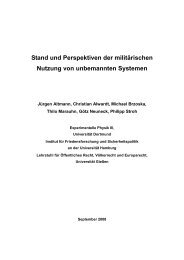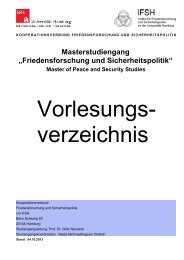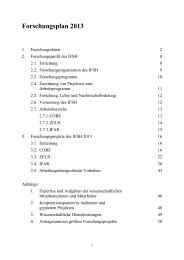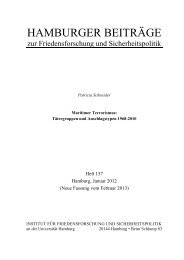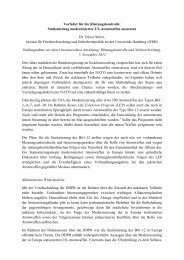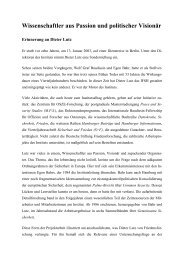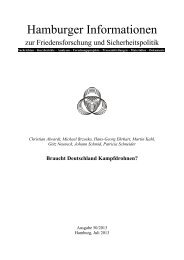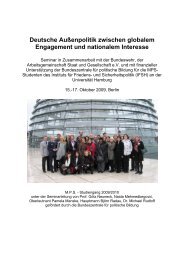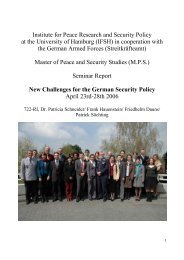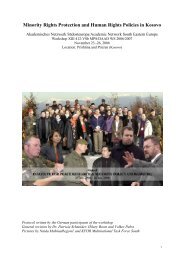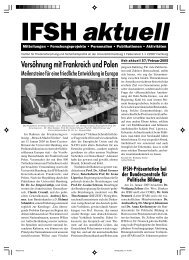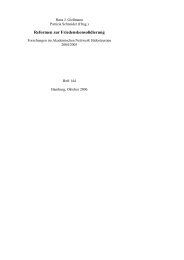Download | PDF - IFSH
Download | PDF - IFSH
Download | PDF - IFSH
Erfolgreiche ePaper selbst erstellen
Machen Sie aus Ihren PDF Publikationen ein blätterbares Flipbook mit unserer einzigartigen Google optimierten e-Paper Software.
since the PISG intensified its efforts to communicate with minority communities in 2006 and focused<br />
its programs on issues important to the minorities, such as return of refugees and security.<br />
However, the lack of participation from the Kosovo Serbs has restricted the work of the PISG in<br />
establishing new relations with local communities in minority enclaves. 56<br />
With the resolution of the final status of Kosovo, the Kosovo government must develop clear<br />
mechanisms for the implementation of policies that will result from the status provisions. One of<br />
the necessary efforts accomplishments is to secure representation for all citizens, with special attention<br />
to the minorities. “Acknowledging popular concerns about ethnic rights in this explicit fashion<br />
is often better than wishing them away.” 57 The governing institutions need to work exhaustively to<br />
gain the trust of the Serbian population. However, the successful implementation of any final status<br />
settlement will require the participation of the Kosovo Serbs. Their independence from Belgrade<br />
should help them work for their own interests and identity. For further progress on building the<br />
foundations for reconciliation in the Kosovar society, the government needs to:<br />
- begin the implementation of the Plan for Confidence Building and Reconciliation as an<br />
initial step for a recognized reconciliation program on the national level;<br />
- initiate a national strategy for reconciliation by declaring openly the necessity of such a<br />
process and proceed with policies that promote joint projects involving all communities<br />
(i.e. bilingual schoolbooks for mixed schools);<br />
- resist accepting failure or stagnation in reconciliation policies due to the fact that the Serbian<br />
government has not apologized for the crimes of 1999;<br />
- avoid leaving reconciliation to be fulfilled by time. Time alone does not build trust,<br />
whereas an obligation provided by the institutions, encouraging the population to cooperate<br />
with one another, is a good way to help build trust;<br />
- cooperate with Kosovo Serbs who have already accepted the Kosovo institutions, and intensify<br />
work to encourage minority participation in local and national political institutions<br />
and to decrease the climate of insecurity;<br />
- plan to incorporate Kosovo Serb parallel structures into the system, 58 in order to convince<br />
the Serbian minority of their rightful place in society and to avoid further ethnic division.<br />
Insisting on the significant impact a strong political leadership can have in uniting a divided society,<br />
the Kosovo government should increase their efforts to communicate with local communities.<br />
“Leaders give their societies permission to say the unsayable, to think the unthinkable, to rise to<br />
gestures of reconciliation that people, individually, cannot imagine” 59 . The resolution of the final<br />
status of Kosovo will open the way for more legitimacy and responsibility in the Kosovo governing<br />
institutions. Both Kosovo Albanians and Kosovo Serbs have to learn to accept each other as<br />
equally valuable parts of the same society. The goal of a multiethnic Kosovar society is “a major<br />
challenge but not an impossible mission”. 60<br />
Bibliography<br />
Afzali, Aneelah and Colleton, Laura. Constructing Coexistence, 2003. In: Chayes, Ayntonia and<br />
Minow, Martha (Eds), Imagine Coexistence: Restoring humanity after violent ethnic conflict.<br />
Jossey-Bass, San Francisco, pp. 3-20.<br />
Assembly of Kosovo, 2004. Ligji Kundër Diskriminimit. Nr. 2004/ 3. Prishtina<br />
Barsalou, Judy, 2005. Trauma and Traditional Justice in Divided Societies. Special Report 135.<br />
United States Institute of Peace. Retrieved June 11, 2006. See: http://www.usip.org/<br />
pubs/specialreports/sr135.pdf.<br />
56 UN Security Council. Doc. S/2006/361, op. cit. pp. 10-23.<br />
57 Collier, op.cit., p. 140.<br />
58 Compare with: ICG. Europe Report No. 165, op.cit., p. 4.<br />
59 Cited in: Rigby, Andrew. Twenty observations on ‘post-settlement’ reconciliation, p. 8 (2006).<br />
60 Tütsch, op.cit., p. 35.<br />
41



